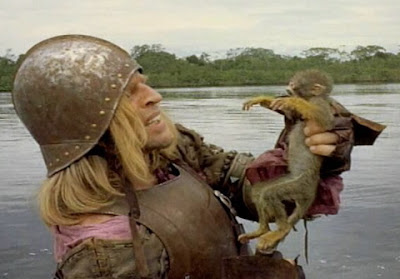You step off the dilapidated coach, warm trade-winds kicking at the fedora you haggled for at the village market, and into your “resplendent” holiday villa-complex. Then you discover the brochure hadn’t been entirely truthful. You were promised El Dorado, the Mysterious City of Gold, and instead you got El Dorado, the feeble and short-lived BBC soap-opera. What you thought was a weather-beaten sign pointing a road to a quaint, abandoned pueblo turned out to be a village of sadistic, godless cannibals.
Welcome to the jungle! Or, more accurately, the land around Machu Picchu, where Aguirre, Wrath of God was shot on stolen cameras and a wing and a prayer. Director Werner Herzog corralled a cast and crew of 450 people to make a terrifying trip down eroded Inca steps, the film’s opening shot. Fighting vertigo and extreme rain, the filmmakers managed to transport people, animals and equipment into a hostile rainforest to film a sloppy, uneven cinematic classic.
Based on the little knowledge Herzog had of real-life adventurer Lope de Aguirre, the film traces the journey of a band of Spanish conquistadors travelling down the Amazon in search of the fabled riches of El Dorado. While searching, their infighting and ill-preparedness threatens to undo all of them.
Something is awry in Aguirre. The pacing of is erratic, the performances uneven and the characterisation inconsistent. Yet it is a unique and compelling film. The brooding hulk of Klaus Kinski gives us an arresting and unpredictable soul who stubbornly believes he is right when all falls to pieces around him. Everyone, even Kinski, play second fiddle to the land that hates them so. It is primordial and awesomely beautiful and the camera lingers long enough to make you love and fear it in equal measure.
Its hard to work out if some of the actors have been told to act bored and unhappy or whether they really just don’t want to be miles from anywhere with a film crew and a metric ton of tropical diseases. Either way Aguirre is a awash with disinterested faces and muddled motives. The film fails to give us a cohesive narrative, thanks to Herzog’s insistence on turning up in the jungle and constructing a film on the fly. Look again though and you realise it doesn’t matter. Aguirre is a glorious mess, a fascinating, filthy jumble of thwarted ambition, angry nature and godless devils who strike indiscriminately from the trees. Its not just the local “savages” who threaten the “good’ Christians looking for El Dorado either. The making of the film is just as tumultuous, with Kinski turning up ready for a full jungle experience then demanding a hotel away from everyone else when faced with insects, humidity and rain. In his time on set he raged and sulked and demanded that crew be fired for looking at him wrong. Herzog even threatened to put a bullet in his head when Kinski was prepared to leave the film on a boat. After that he was a more subdued presence on set.
Aguirre is by not an easy film to watch. It gives us extras who stare at the camera, scenes that go on too long, and then on further to nowhere. Kinski seems to be in a different film to the other actors, such is the gap between his performance and thiers. Herzog throws incongruous moments of slapstick comedy into the mix too. The bizarre lasts words of a speared man or the horse that stares inscrutably back at the disintegrating raft it has just been pushed off. Its hard not to marvel at the hubris of the greedy conquistadors facing deadly currents and mounting insanity. Aguirre is a beautiful, repellent masterpiece and proof that Herzog is a director of boldness and ambition.
Aguirre, Wrath of God has been restored and opens a season of Werner Herzog’s films at the BFI in London on 7th June



